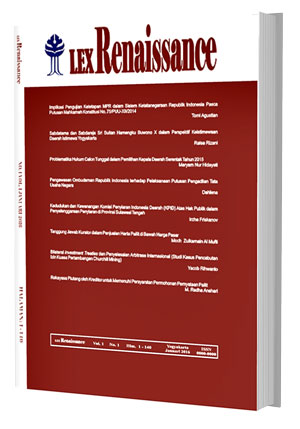Main Article Content
Abstract
Keywords
Article Details
Authors who publish with this journal agree to the following terms:
a. Authors retain copyright and grant the journal right of first publication with the work simultaneously licensed under a Creative Commons Attribution License that allows others to share the work with an acknowledgement of the work's authorship and initial publication in this journal.
b. Authors are able to enter into separate, additional contractual arrangements for the non-exclusive distribution of the journal's published version of the work (e.g., post it to an institutional repository or publish it in a book), with an acknowledgement of its initial publication in this journal.
c. Authors are permitted and encouraged to post their work online (e.g., in institutional repositories or on their website) prior to and during the submission process, as it can lead to productive exchanges, as well as earlier and greater citation of published work (See The Effect of Open Access).References
- Buku
- Abd. Rahman, Zaharuddin, Fiqh Kewangan Islam, PTS Islamika, Malaysia, 2014.
- Antonio, Muhammad Safii, Bank Syariah Dari Teori Ke Praktek, Gema Insani Press, Jakarta, 2001.
- Arfan, H. Abbas, 99 Kaidah Fiqh Muamalah Kulliyah, Cetakan II, UIN Maliki Pers, Malang, 2013.
- Ascarya, Akad & Produk Bank Syariah, Raja Grafindo Persada, Jakarta, 2011 .
- Badrulzaman, Mariam Darus, Perjanjian Kredit Bank, Citra Aditya Bakti, Bandung, 1991.
- Fuady, Munir, Hukum Perbankan Modern, Buku Kesatu, Citra Aditya Bakti, Bandung, 2003.
- Rokamah, Ridho, Al-Qawaid Al-Fiqhiyah Kaidah-Kaidah Mengembangkan Hukum Islam, Stain Press, Ponorogo, 2010.
- Satrio, J., Hukum Perikatan Perikatan pada Umumnya, Alumni, Bandung, 1999.
- Susanto, Aspek-Aspek Hukum Perkreditan pada Bank, Jakarta, Alfabeta, 2003.
- Jurnal
- Lailiyah, Ashofatul, “Urgensi Analisa 5C pada Pemberian Kredit Bank untuk Meminimalisir Resiko”, Yuridika, Vol. 29 No. 2 Mei-Agustus 2014.
- Purwanto, Harry, Keberadaan Asas Rebus Sic Stantibus Dalam Perjanjian Internasional, Jurnal Mimbar Hukum Edisi Khusus, November 2011.
- Suhaeri, “Putusan Mahkamah Konstitusi Menghapus Rintisan Sekolah Bertaraf Internasional dalam Tinjauan Maqashid Syari’ah”, Jurnal Konsitusi, Vol. 10 No. 2 Juni 2013.
- Peraturan Perundang-undangan
- Kitab Undang-Undang Hukum Perdata.
- Undang-Undang Nomor 21 Tahun 2008 tentang Perbankan Syariah; Lembaran Negara Republik Indonesia Tahun 2008 Nomor 94.
- Undang-Undang Nomor 21 Tahun 2011 tentang OJK; Tambahan Lembaran Negara Republik Indonesia Nomor 5253.
- Peraturan Mahkamah Agung Republik Indonesia Nomor 02 Tahun 2008 tentang Kompilasi Hukum Ekonomi Syariah KUHPerdata.
- Kompilasi Hukum Ekonomi Syari’ah.
- Fatwa Dewan Syariah Nasional No 04/DSN-MUI/IV/2000 tentang Murabahah.
- Wawancara
- Hasil wawancara dengan Bapak Aryo Bramasto (ASO Account Officer) Bank BCA Syaiah KCU Yogyakarta, KCP Mangkubumi
- Hasil wawancara dengan perwakilan Baitul Maal Wat Tamwil, Wates Kulonprogo
- Hasil wawancara dengan perwakilan PT Bank Pembiayaan Rakyat Syariah UNISIA Insan Indonesia, Yogyakarta
- Internet
- OJK, “Standar Produk Perbankan Syariah Murabahah”, diakses dari https://www.ojk.go.id/id/kanal/syariah/berita-dan-kegiatan/publikasi/Documents/Pages/Buku-Standar-Produk-Perbankan-Syariah-Murabahah/Buku%20Standar%20Produk%20Murabahah.pdf pada tanggal 13 Juli 2019 pukul 20 : 11 WIB
References
Buku
Abd. Rahman, Zaharuddin, Fiqh Kewangan Islam, PTS Islamika, Malaysia, 2014.
Antonio, Muhammad Safii, Bank Syariah Dari Teori Ke Praktek, Gema Insani Press, Jakarta, 2001.
Arfan, H. Abbas, 99 Kaidah Fiqh Muamalah Kulliyah, Cetakan II, UIN Maliki Pers, Malang, 2013.
Ascarya, Akad & Produk Bank Syariah, Raja Grafindo Persada, Jakarta, 2011 .
Badrulzaman, Mariam Darus, Perjanjian Kredit Bank, Citra Aditya Bakti, Bandung, 1991.
Fuady, Munir, Hukum Perbankan Modern, Buku Kesatu, Citra Aditya Bakti, Bandung, 2003.
Rokamah, Ridho, Al-Qawaid Al-Fiqhiyah Kaidah-Kaidah Mengembangkan Hukum Islam, Stain Press, Ponorogo, 2010.
Satrio, J., Hukum Perikatan Perikatan pada Umumnya, Alumni, Bandung, 1999.
Susanto, Aspek-Aspek Hukum Perkreditan pada Bank, Jakarta, Alfabeta, 2003.
Jurnal
Lailiyah, Ashofatul, “Urgensi Analisa 5C pada Pemberian Kredit Bank untuk Meminimalisir Resiko”, Yuridika, Vol. 29 No. 2 Mei-Agustus 2014.
Purwanto, Harry, Keberadaan Asas Rebus Sic Stantibus Dalam Perjanjian Internasional, Jurnal Mimbar Hukum Edisi Khusus, November 2011.
Suhaeri, “Putusan Mahkamah Konstitusi Menghapus Rintisan Sekolah Bertaraf Internasional dalam Tinjauan Maqashid Syari’ah”, Jurnal Konsitusi, Vol. 10 No. 2 Juni 2013.
Peraturan Perundang-undangan
Kitab Undang-Undang Hukum Perdata.
Undang-Undang Nomor 21 Tahun 2008 tentang Perbankan Syariah; Lembaran Negara Republik Indonesia Tahun 2008 Nomor 94.
Undang-Undang Nomor 21 Tahun 2011 tentang OJK; Tambahan Lembaran Negara Republik Indonesia Nomor 5253.
Peraturan Mahkamah Agung Republik Indonesia Nomor 02 Tahun 2008 tentang Kompilasi Hukum Ekonomi Syariah KUHPerdata.
Kompilasi Hukum Ekonomi Syari’ah.
Fatwa Dewan Syariah Nasional No 04/DSN-MUI/IV/2000 tentang Murabahah.
Wawancara
Hasil wawancara dengan Bapak Aryo Bramasto (ASO Account Officer) Bank BCA Syaiah KCU Yogyakarta, KCP Mangkubumi
Hasil wawancara dengan perwakilan Baitul Maal Wat Tamwil, Wates Kulonprogo
Hasil wawancara dengan perwakilan PT Bank Pembiayaan Rakyat Syariah UNISIA Insan Indonesia, Yogyakarta
Internet
OJK, “Standar Produk Perbankan Syariah Murabahah”, diakses dari https://www.ojk.go.id/id/kanal/syariah/berita-dan-kegiatan/publikasi/Documents/Pages/Buku-Standar-Produk-Perbankan-Syariah-Murabahah/Buku%20Standar%20Produk%20Murabahah.pdf pada tanggal 13 Juli 2019 pukul 20 : 11 WIB




